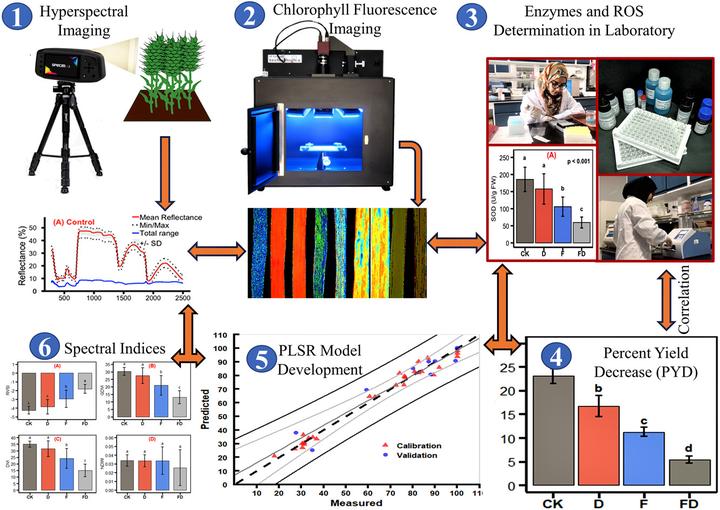Detection of combined frost and drought stress in wheat
 combine hyperspectral (HSI) and chlorophyll fluorescence imaging (CFI) to characterize individual and interactive frost and drought stress
combine hyperspectral (HSI) and chlorophyll fluorescence imaging (CFI) to characterize individual and interactive frost and drought stress
Abstract
Immediate detection and prediction tools for interactive stresses are essential to avoid yield losses. This study investigated the capability of hyperspectral (HSI) and chlorophyll fluorescence imaging (CFI) to characterize individual and interactive frost (−4 ◦C) and drought (40% soil moisture content) stress responses at the booting stage of wheat under controlled environmental conditions. HSI full range reflectance (280–2500 nm), CFI, and traditional responses (leaf water content, photosynthesis, and enzymatic activity) were measured from flag leaves. The potentiality of HSI to detect cellular damage in terms of enzymatic activity was explored by developing partial least square regression (PLSR) models, and spectral indices were calculated to characterize the responses to individual and combined stresses. Reflectance in 360, 700, 1400, 1900, and 2460 nm wavebands showed the most important variables in developing PLSR models for enzymes. Superoxide dismutase, peroxidase, and ascorbate peroxidase showed the highest R2c (0.99, 0.95, and 0.98), R2v (0.94, 0.90, 0.93), and the ratio of prediction to deviation (4.04, 3.06, and 3.85). CFI decreased under individual frost and combined frost and drought stresses. Ratio vegetation stress index (RVSI), green difference vegetation index (GDVI), difference vegetation index (DVI), and normalized difference water index (NDWI) were the most important variables and could be used to detect combined frost and drought by determining enzymatic activity and reactive oxygen species (ROS), verified by PLSR models. Spectral indices and enzyme activities showed a strong correlation in determining yield losses. Hence, HSI and CFI techniques successfully detected combined frost and drought stresses for rapid quantification.